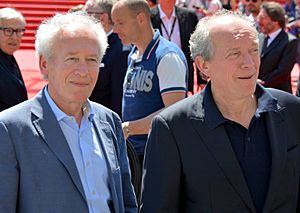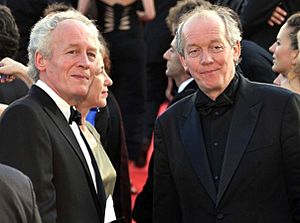Dardenne brothers facts for kids
Quick facts for kids
Jean-Pierre and Luc Dardenne
CMW
|
|
|---|---|

Luc (right) and Jean-Pierre Dardenne in 2015
|
|
| Born | Jean-Pierre: 21 April 1951 Liège, Belgium Luc: 10 March 1954 Liège, Belgium |
| Occupation | Film directors, producers, screenwriters |
| Years active | 1978–present |
| Awards | Full list |
Jean-Pierre Dardenne (born April 21, 1951) and Luc Dardenne (born March 10, 1954) are brothers from Belgium. They are famous filmmakers, often called the Dardenne brothers. They work together to write, produce, and direct all their movies. Their films often show stories about everyday life and the challenges people face in Europe. They also own a film company called Les Films du Fleuve.
The Dardenne brothers started making films in the late 1970s. They made both story-based movies and documentaries. They became well-known around the world in the mid-1990s with their film La Promesse.
They won their first big international award when their movie Rosetta received the Palme d'Or at the 1999 Cannes Film Festival. The Palme d'Or is one of the highest awards a film can win. In 2005, they won the Palme d'Or again for their film L'Enfant. This made them one of only a few filmmakers to win this award twice.
Their film Lorna's Silence (2008) won the Best Screenplay award at the 2008 Cannes Film Festival. Their 8th film, The Kid with a Bike, won the Grand Prix at the 2011 Cannes Film Festival. This is another major award at Cannes. It was also nominated for a Golden Globe Award.
In 2015, their movie Two Days, One Night was nominated for many awards. It even received an Oscar nomination for Best Actress for Marion Cotillard. Their 2019 film Young Ahmed won Best Director at the 2019 Cannes Film Festival. Their 2022 film Tori and Lokita won the 75th Anniversary Prize at the 2022 Cannes Film Festival. Their most recent film, The Young Mother's Home, won Best Screenplay at the 2025 Cannes Film Festival.
Contents
Making Movies: The Dardenne Brothers' Style
Jean-Pierre and Luc Dardenne are known for making very realistic films. These movies often show the lives of working-class people in Belgium. Since 1996, they have created many important films.
Movies like La Promesse (1996), Rosetta (1999), Le Fils (2002), and L'Enfant (2005) often feature young people. These characters are sometimes on the edges of society, like immigrants or those without jobs. Both Rosetta and L'Enfant won the Palme d'Or at the Cannes Film Festival. They are the only Belgian films to have won this honor.
Early Life and First Films
The Dardenne brothers grew up in Seraing, a town in the Liège region of Belgium. Jean-Pierre, born in 1951, studied drama. Luc, born three years later, studied philosophy.
In 1975, they started their own production company called Derives. They made about sixty documentary films before they started making feature films. These documentaries covered many different topics. Their first two feature films, Falsch (1987) and Je pense a vous (1992), are not widely known today. Their first big international success was La Promesse in 1996.
In 1994, they started another production company, Les Films du Fleuve. This company produces all their own films. It also produces films by other European directors, like Ken Loach.
Focusing on Real-Life Issues
With Rosetta, the Dardennes focused on the difficulties of being unemployed. Émilie Dequenne, who had never acted in a film before, played the main character, Rosetta. Rosetta is a young woman living with her mother in a trailer park. The film shows Rosetta's search for a purpose in life, which she believes can only be found through work. She looks for even the smallest jobs.
Rosetta was the first Belgian film to win the Palme d'Or at Cannes. It won against films by famous directors like David Lynch. After the film came out, it helped inspire a new labor law in Belgium. This law was designed to protect young workers like Rosetta. Jean-Pierre said it was "pure chance" that the law was named after their film. Luc added that they hope their films make people think, but they don't expect to change the world.
Their fourth film, L'Enfant (The Child), also dealt with difficult situations. This film earned the Dardennes their second Palme d'Or award. It was their second win in just seven years. L'Enfant also won the André Cavens Award in 2005. This made the Dardenne brothers four-time winners of that award.
Working with Actors
The Dardenne brothers often work with the same people on their films. This includes their cinematographer Alain Marcoen and editor Marie-Hélène Dozo. Actors like Jérémie Renier and Olivier Gourmet have appeared in many of their movies. Jérémie Renier played characters in La Promesse, L'Enfant, and The Kid with a Bike. Olivier Gourmet had small roles in L'Enfant and The Unknown Girl.
Luc Dardenne explained how they work with actors. He said their process is very physical. They don't just tell actors what to say. They walk them through the movements and try different versions. They focus on the physical actions first, without the camera. Then, they set up the camera movements. This way, they can change small details as they go.
The Dardennes often use handheld cameras. They also use natural light in their films.
Recent Work and Recognition
In June 2012, the Dardenne brothers were invited to join the Academy of Motion Picture Arts and Sciences. This is the group that gives out the Oscar awards. In the same year, Jean-Pierre was the head of the jury for short films at the 2012 Cannes Film Festival.
Their 2014 film Two Days, One Night was chosen to compete for the Palme d'Or at the 2014 Cannes Film Festival. The film won three Magritte Awards, including Best Film and Best Director. Marion Cotillard received an Oscar nomination for her acting in the film. This was the first Oscar nomination for an actor in a Dardenne brothers film.
In 2014, their entire body of work received a special prize at the Cannes Film Festival. This was for the 40th Anniversary of the Ecumenical Jury.
In 2016, they released The Unknown Girl. This film stars Adèle Haenel as a young doctor. She tries to find out who a young woman was after she is found dead near the doctor's clinic.
Their 2019 film Young Ahmed was about a Belgian teenager. It was nominated for the Palme d'Or at Cannes, and they won the Best Director prize for it. Their 2022 film Tori and Lokita was also nominated for the Palme d'Or and won the 75th Anniversary Prize.
Filmography
Feature Films Directed
| Year | English Title | Original Title | Directors | Screenwriters | Producers | Notes |
|---|---|---|---|---|---|---|
| 1987 | Falsch | Yes | Yes | |||
| 1992 | Je pense à vous | Yes | Yes | Yes | ||
| 1996 | La Promesse | Yes | Yes | |||
| 1999 | Rosetta | Yes | Yes | Yes | Palme d'Or at the 1999 Cannes Film Festival | |
| 2002 | The Son | Le Fils | Yes | Yes | Yes | |
| 2005 | L'Enfant | Yes | Yes | Yes | Palme d'Or at the 2005 Cannes Film Festival | |
| 2008 | Lorna's Silence | Le Silence de Lorna | Yes | Yes | Yes | Best Screenplay at the 2008 Cannes Film Festival |
| 2011 | The Kid with a Bike | Le gamin au vélo | Yes | Yes | Yes | Grand Prix at the 2011 Cannes Film Festival |
| 2014 | Two Days, One Night | Deux jours, une nuit | Yes | Yes | Yes | |
| 2016 | The Unknown Girl | La Fille inconnue | Yes | Yes | Yes | |
| 2019 | Young Ahmed | Le Jeune Ahmed | Yes | Yes | Yes | Best Director at the 2019 Cannes Film Festival |
| 2022 | Tori and Lokita | Tori et Lokita | Yes | Yes | Yes | 75th Anniversary Special Award at the 2022 Cannes Film Festival |
| 2025 | Young Mothers | Jeunes mères | Yes | Yes | Yes | Best Screenplay at the 2025 Cannes Film Festival |
Films Produced by Them (Only Producers)
| Year | Title | Notes |
|---|---|---|
| 1995 | Faute de soleil | Co-producers |
| 2001 | The Milk of Human Kindness | |
| 2003 | The Living World | |
| Stormy Weather | ||
| The Sun Assassinated | ||
| 2005 | The Axe | |
| 2006 | The Colonel | |
| 2007 | Vous êtes de la police? | |
| 2009 | The Front Line | |
| 2010 | K.O.R. | |
| 2011 | The Minister | |
| 2012 | Rust and Bone | Co-producers |
| Beyond the Hills | ||
| 2013 | Marina | |
| Je fais le mort | ||
| 2014 | Wild Life | |
| 2015 | Diary of a Chambermaid | |
| 2015 | Cowboys | |
| 2015 | Long Live the Bride | |
| 2016 | Le Fils de Joseph | |
| Hedi | ||
| Graduation | ||
| Pericle | ||
| Les Carnivores | ||
| 2023 | Jeanne du Barry | |
| 2023 | The Old Oak |
Documentaries Produced
| Year | Title | Credited as | Notes | ||
|---|---|---|---|---|---|
| Directors | Screenwriters | Producers | |||
| 1978 | Le Chant du rossignol | Yes | |||
| 1980 | Pour que la guerre s'achève, les murs devraient s'écrouler | Yes | Yes | ||
| 1981 | R... ne répond plus | Yes | Yes | Also cinematographers and editors | |
| 1982 | Leçons d'une université volante | Yes | Yes | Also cinematographers | |
| 1983 | Regarde Jonathan, Jean Louvet, son œuvre | Yes | Also editors and camera operators | ||
| 1997 | Gigi, Monica... et Bianca | Yes | Executive producers | ||
| 2000 | La Devinière | Yes | Line producer | ||
| 2002 | Brook by Brook | Yes | TV; co-producers | ||
| 2002 | Romances de terre et d'eau | Yes | |||
| 2005 | Il fare politica | Yes | |||
| 2006 | Rwanda, les collines parlent | Yes | |||
| 2007 | Why We Can't See Each Other Outside When the Sun is Shining | Yes | |||
| 2009 | Children Without a Shadow | Yes | Executive producers | ||
| 2012 | Un été avec Anton | Yes | TV | ||
| 2013 | À ciel ouvert | Yes | Co-producers | ||
Short Films Produced
| Year | Title | Credited as | Notes | ||
|---|---|---|---|---|---|
| Directors | Screenwriters | Producers | |||
| 1979 | Lorsque le bateau de Leon M. descendit la Meuse pour la première fois | Yes | Yes | Documentary; also cinematographers | |
| 1987 | Il court, il court, le monde | Yes | Yes | ||
| 1999 | L'Héritier | Yes | Executive producers | ||
| 2002 | First Love | Yes | |||
| 2007 | Dans l'obscurité | Yes | Yes | Part of the film To Each His Own Cinema | |
| 2008 | Premier Jour | Yes | |||
| 2011 | Bloody Eyes | Yes | |||
Awards and Honors
- 2005: Grand-Cross of the Order of the Crown (Belgium)
- 2008: Film Award Cologne at the Cologne Conference
See also
 In Spanish: Hermanos Dardenne para niños
In Spanish: Hermanos Dardenne para niños


